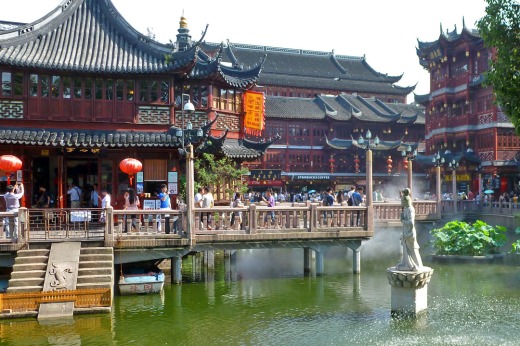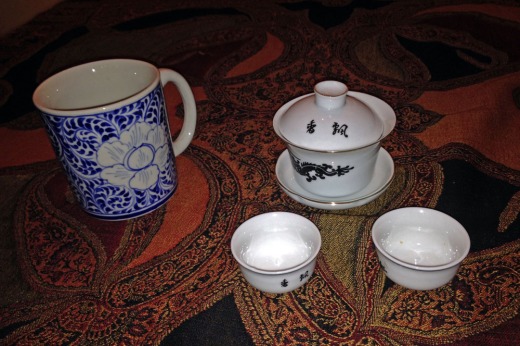“Fool me once, shame on you,” George W. Bush said, then got famously lost in the witticism and stammered, “you can’t get fooled again.”
How I wish that were true. My husband and I are experienced travelers, often logging in more than 20,000 international air miles a year. We know the usual scams: taxi drivers with spinning meters, young men who jostle you and steal your wallet, and friendly people who approach you on the street wanting to be helpful. Yet somehow our scam detectors were turned off in China last year.
In June, my husband Moshe was alone in Shanghai, doing what he loves best: exploring the city on public transportation, which is safer, he feels, than trusting tricky taxi drivers. As he emerged from the YuYuan subway station, a young Chinese couple approached him speaking fluent English and introduced themselves as Wang Xi and Ji Beibei. With small backpacks, they looked like the students they claimed to be. Visitors from Beijing, they said they were looking for a traditional tea ceremony. Would he care to join them? As a mathematics professor, he enjoys Chinese students. Why not, he thought. He had the next two hours free and had no interest in visiting the Starbucks and other touristy destinations in the YuYuan market.
The couple led him down an alley and into a small shop, where a young woman in a red silk robe greeted them. “Over 3,000 types of tea are grown in China,” she explained in Chinese, which Moshe’s new friends translated into English. As they sampled six different types of tea in tiny cups, the woman told stories about each one.
Moshe was captivated by a flowering tea ball, made from leaves picked in the early morning dew. The leaves had been sewn with cotton thread into different shapes and then dried. When the tea ball was covered with steaming water, it grew a yellow stem and slowly blossomed into a stunning red flower. Moshe also enjoyed watching a teapot and cups with dragons that changed from black to red when filled with hot tea.
It was a pleasant afternoon, the students were good company, and they promised to e-mail him the pictures they took. When the ceremony was over, the guests were encouraged to buy something to take home. Moshe chose a two-ounce dragon teapot with tiny cups and a container of the flower tea, both of which he wanted me to see. One of the students gave Moshe a tin of fruit tea as a present.
All went well until Moshe got the bill. He was shocked. Moshe’s share came to 1,660 RMB, about $280. He didn’t have that much cash on him, so he paid with a credit card. Wang Xi also produced a credit card for his share of the bill, but Moshe later realized that he never saw him sign a receipt. It had been an expensive afternoon. Fool me once.
The second incident occurred in late December, when Moshe and I stayed overnight in Beijing as we traveled from Hanoi to Seattle. He was eager to take me to Tiananmen Square and the Forbidden City, which he had visited three months earlier. By the time we made our way to the square on public transportation it was 8:00 pm. it was dark and cold, and everything was closed.
Yet the buildings were lit and we could see the 109-acre Tiananmen Square, where a million Chinese led by students had gathered nearly 25 years ago to demand a more democratic government, and where many hundreds were killed when the military brutally evicted them from the square they had occupied for seven weeks.
As we walked across the broad street separating Tiananmen Square from the Forbidden City, my thoughts were on the brave students who had stood up to their government. Once the home of emperors, the Forbidden City was now a UNESCO World Heritage Site, housing the world’s largest collection of ancient wooden structures. Like commoners of old, we were barred from entering the city, which was locked up tight and patrolled by guards.
Hungry and cold, we began to search for the restaurant Moshe had found on his earlier visit. Two friendly young women asked if they could help us. “We’re looking for a place to eat,” we told them. “What would you suggest?”
“We can show you a place,” they offered, guiding us around the eastern walls of the Forbidden City, the opposite direction from where they had been going. As we walked one said she was a kindergarten teacher and the other was a computer science student. “Where were you going on this cold night before you joined us?” I asked. They muttered something about being out for a walk.
We followed them into a small bar and were shown to a back room. It didn’t seem like a place that served food, but the girls assured us we could get something to eat. They suggested we have a stir fry. At that point anything hot sounded good, so that’s what we ordered. They also recommended we drink some hot tea and we readily agreed. The waitress bought a pot of tea and some tiny cups, which we began to sip.
Eventually the food arrived, which was served unceremoniously in Styrofoam containers accompanied by chopsticks. How tacky, I thought, but still did not suspect anything amiss.
The teacher who sat next to me eagerly talked about her pupils and showed us how to write our names in Chinese. Moshe had more difficulty making conversation with the computer science student, who seemed uncomfortable and had no interest in discussing her major.
They insisted we try another kind of tea even though we hadn’t finished the first pot. We didn’t know how to turn off the waitress, who, like a sorcerer’s apprentice, kept returning with more pots of tea for us to sample.
Then the teacher proposed we share a bottle of wine; it was the custom in their country to drink wine with new friends, she said. She had found my weakness. I had been in Asia for a month and was missing my nightly glass of red wine. The food had been quite ordinary, and I was already tired of the tea. I might as well get something out of the evening. She flashed the wine list, but the Chinese description and prices made no sense to me so I agreed to the French wine she suggested.
After drinking the wine, we were ready to head back to the hotel and Moshe asked for the check. Even the experience in Shanghai hadn’t prepared him for the shocking bottom line: 1550 RMD, about $250. This time the girls didn’t even pretend to split the cost. Those little pots of tea were $25 each and the four glasses of wine came to over $100. Since we were leaving the country the next morning, we felt we had no choice but to pay the bill.
We learned an expensive lesson, which in retrospect seems so obvious. In both cases, the scammers were appealing young people who readily engaged us in conversation. Our faces turned red when we read on Trip Advisor that we had been easy prey for these con artists, who frequent the tourist areas of China’s two largest cities.
Moshe added our voices to those online warning of such scams: Don’t follow strangers into shops they pick; don’t let them make choices for you; and always find out the price first.
George Bush was wrong. You can get fooled again.




Good reminder for us all when we travel in foreign countries – and maybe here too. I can see the experience turning into a “3 Truths and a Lie” question!
By: Peggy Kivel on February 25, 2014
at 11:23 pm
Nice blog grandma!!!
I’m attaching a short poem I wrote for my creative writing class. Thought you might enjoy–
By: Sarah Chatta on February 26, 2014
at 4:45 am
wow
By: Barbara Silverstein on February 26, 2014
at 9:54 am
Well, your blog shows we weren’t wrong about George Bush! Anyway – a good warning for Barry, the adventurer, as he heads off to China in June. Mostly he’ll be with a botanical tour, but the adventures that were proposed to you sound like something that could be very intriguing to anyone. Live and learn, and thanks for sharing!. (At least you didn’t buy a rug.)
By: m51063 on March 1, 2014
at 3:51 pm